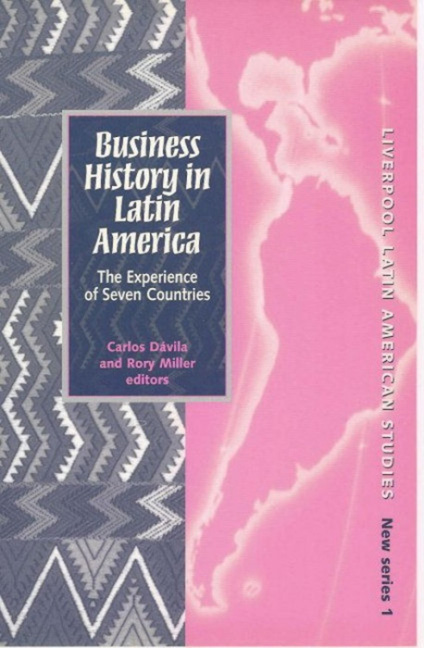Book contents
- Frontmatter
- Contents
- Preface
- Notes on Contributors
- Glossary
- 1 Business History in Latin America: an introduction
- 2 Business History in Argentina
- 3 Business History in Brazil from the mid-nineteenth century to 1945
- 4 Business History in Chile 1850–1945
- 5 Business History in Colombia
- 6 Regional Studies and Business History in Mexico since 1975
- 7 Business History in Peru
- 8 Economic and Business History in Venezuela
- 9 Bibliography
- Index
5 - Business History in Colombia
- Frontmatter
- Contents
- Preface
- Notes on Contributors
- Glossary
- 1 Business History in Latin America: an introduction
- 2 Business History in Argentina
- 3 Business History in Brazil from the mid-nineteenth century to 1945
- 4 Business History in Chile 1850–1945
- 5 Business History in Colombia
- 6 Regional Studies and Business History in Mexico since 1975
- 7 Business History in Peru
- 8 Economic and Business History in Venezuela
- 9 Bibliography
- Index
Summary
In Colombia the study of business history is in its early stages. The first works specifically dedicated to this subject, those of the North American historian, Frank Safford, appeared in the middle of the 1960s. However, the last two decades have seen a slow but gradual expansion of this area of research. The literature is somewhat disparate, produced by individual researchers, rather than research teams. They have come from a wide range of social science disciplines, and been located in very different faculties and university departments: management, history, economics, and sociology. Foreign scholars have made a significant contribution. This is not without merit since Colombians have been opening up a field which is quite well developed on an international level, especially in Great Britain and the United States, and which, from the beginning, has been ‘something of a no man's land, on the frontiers between economics, history and sociology’. The literature published since 1965 has resulted in new research themes and stimulated important questions, and it has aroused interest in different units of analysis – regional business elites, companies, entrepreneurs, families of businessmen, economic groups, and business associations – all of which had tended to receive very little attention in Colombia.
The number of important reviews of the historical literature undertaken in the last few years is evidence of the marked advance of research overall in Colombia since the mid-1970s. Nevertheless, these surveys consistently display a lack of interest in business issues, and this is evident both in the approaches of the authors and the works which they consider. At best business issues are included in the surveys but analysed in a very marginal or incomplete fashion, or else they are treated with indifference and simply as an appendage to the ‘economic historiography’. As a consequence they largely fail to analyse the contributions that have been made to the study of business and businessmen. These surveys have thus omitted numerous studies, particularly on the twentieth century.
Rather than quibbling about such omissions, which are probably inevitable in this type of task, or criticising the criteria used in these otherwise valuable surveys of the historiography, it would be more sensible to advance by means of a specialised review of a field which is just taking shape and which might shed some light on its potential, its utility, and its future research agenda.
- Type
- Chapter
- Information
- Business History in Latin AmericaThe Experience of Seven Countries, pp. 83 - 115Publisher: Liverpool University PressPrint publication year: 1999

